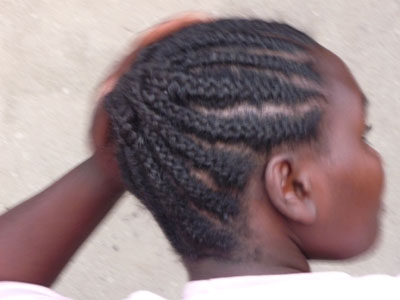
Candice Knezevic, the RAISE Hope for Congo campaign manager, is currently traveling in eastern Democratic Republic of the Congo.
On our first day in Goma, we met with Justine Masika Bihamba, who founded Synergie de Femmes pour les Victimes de Violences Sexuelles. Synergie advocates for women’s rights and an end to impunity, works to sensitize armed groups and local populations about the consequences of sexual violence, and coordinates a network of women’s activists throughout North Kivu who act as a first line of defense for women in rural villages who have been raped.
I first met Justine over a year ago on my first visit to Goma. When I see Justine, she tells me things have only gotten worse since I was last here. She says that in the towns of Masisi and Rutshuru, the CNDP, a Rwanda-supported rebel group formerly led by Laurent Nkunda that has recently been integrated into the Congolese army, are more in control than ever before. They are specifically targeting Synergie’s activists with violence, rape and even death, and as a consequence, many have had to flee.
Justine also tells us that the armed groups who control the mineral rich mines are using women as slaves for both labor in the mines and sex. Each day the soldiers “nominate” who they will sleep with that day, and the woman chosen has no means to defend herself against a man holding an AK47 to her head. There are no health centers or schools in these areas, and NGOs like Synergie are unable to carry out sensitization programs there because of the insecurity.
Justine then takes us to Gesom Medical Center, with which Synergie partners, to introduce us to some of the women they work with. She introduces us to a 17 year-old girl, who we’ll call Christine, to whom Synergie has been providing legal help since she arrived at Gesom the week before. Wearing a pink shirt with “America” emblazoned across the front, she sits down resolutely to tell us her story. For someone so young, she strikes me as an incredibly mature and determined young woman. Christine is one of the few survivors of sexual violence who has decided to pursue justice against her perpetrator.
Christine tells us that when she decided to visit her sister-in-law in the hospital, which was about 60 km away, a male family friend offered to drive her. Christine’s family acquiesced, and she set off with this man whom she thought she could trust. Yet rather than taking her to the hospital, he took her to a brothel, raped her, took all of her clothes, and left her locked in the room naked for four days while he went back home. When Christine finally escaped the brothel, she came to Gesom for medical treatment and decided to press charges. Synergie provided her with a lawyer, and when we visited with her, Christine had just found out that her perpetrator had been arrested. She will have to go to court to testify against him, and can only hope that if convicted, her perpetrator will not be released on a paltry bail or paroled too soon.
Rape has been used as a weapon of war in conflicts since the beginning of time. Whether in Vietnam, Bosnia, or in the genocides in Rwanda and Darfur, untold numbers of women have been raped and brutalized at gunpoint. In the context of the conflict in eastern Congo, which has been raging for over a decade, it seems that the rules no longer apply and the mentality of violence and conflict has seeped into the country’s consciousness. Men can do what they want with women’s bodies, and more often than not face no consequences. And many men too have been raped and violated, which often gets overlooked in the widespread epidemic of sexual violence that plagues Congo. As the conflict rages on, Congo has become a place where rape is used as a weapon of intimidation and control, but it is also frequently indiscriminate and opportunistic. There is often no rhyme or reason to the crime, other than the victim happened to be in the wrong place at the wrong time.
As I sat listening to Christine tell her story, a little girl in a pink dress who must have been no more than 18 months old, ran around us giggling and taunting her brothers. I couldn’t help but think what the future holds for this little girl. When she turns 17, like Christine, will the violence still be raging and will the rules still no longer apply in Congo? Or will she be living in a peaceful country as a confident young student, challenging her male peers, planning to attend university, and secure in her knowledge that her body is hers and hers alone? I am hopeful for the latter.

